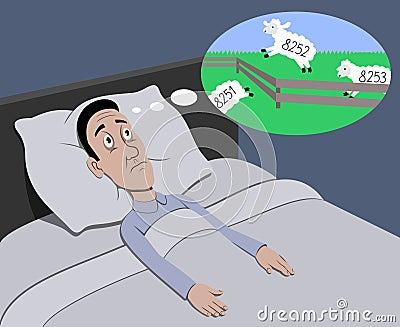Share your quitting journey
- EX Community
- Conversations
- Journals / Blogs
- Can't Sleep? OR Sleep All of the Time?
Can't Sleep? OR Sleep All of the Time?
- Subscribe to RSS Feed
- Mark as New
- Mark as Read
- Bookmark
- Subscribe
- Printer Friendly Page
- Report Inappropriate Content
In the beginning Smoking Cessation can impact not just how tired you feel, but even your dreams, your breathing during sleep, and your body’s internal clock.
For a few weeks after we Quit, Some of us sleep much more than normal, while others find themselves unable to fall asleep or waking up frequently throughout the night. Here’s the catch – We don’t know what our Normal is! Normal s what was prior to being a Smoker with age differences thrown in for good measure!
This phase usually lasts for about two weeks before sleeping patterns stabilize again. In some people, it can last up to a few months. Sleep will eventually settle in to a normal pattern for you as an EX-Smoker. Then aging will exert its normal adjustments. Whether it turns out to be more sleep or less, you will sleep a lot sounder knowing that you are no longer under the control of Nicotine thus risking your health and artificially stimulating your Brain and Body.
As I said Nicotine is a stimulant, and withdrawal often causes a temporary state of depression. See my Blog entitled Good Grief for more about this:
https://excommunity.becomeanex.org/blogs/Thomas3.20.2010-blog/2013/08/16/good-grief
The absence of Nicotine in the Brain also leads to various other Mental and Emotional symptoms such as irritability and Anxiety, which can leave you feeling drained, exhausted and sleeping more than usual. If you’re feeling tired after you stop smoking, allow yourself plenty of rest to help your body get through the withdrawal period. It’s O.K. and won’t last for more than a couple of Weeks.
Conversely, some people find themselves unable to sleep during Nicotine Withdrawal. That was me! I was sleeping 4-6 hours each night at most! Anxiety, cravings, headaches and other symptoms kept me up at night, causing daytime fatigue and irritability. If you have trouble sleeping after you quit smoking, you can try some of these strategies:
- Take a warm bath before bedtime to relax and unwind
- Reduce your caffeine intake by half for a few weeks
- Avoid napping during the day
- Listen to relaxing music in bed
- Try Meditation, Deep Breathing Exercises or Self-Hypnosis
- Take long walks or get more exercise during the day
- Have a cup of warm milk – it contains a sleep-inducing amino acid called tryptophan
- Enjoy a cup of Chamomile Tea or try a special nighttime blend of relaxing herbs such as Valerian, Passionflower and Lemongrass
Smokemares
Nicotine affects brain wave function, and the withdrawal period is often marked by recurring dreams about smoking. One study showed that about one-third of recent EX-smokers reported having at least one dream about smoking in the four weeks following their last cigarette. These extremely vivid dreams often caused Quitters to feel panic and guilt because they dreamed that they had relapsed. The dreams appeared to be withdrawal-related, as they were absent while the participants were still smoking. After one year, 63% of the Quitters studied reported experiencing at least five dreams about smoking. Occasionally even some of us with more than a Year quit report a Smokemare!
These dreams about smoking are completely normal and seem to correlate with an increased likelihood of long-term abstinence. They are generally reported as more frequent and more vivid by individuals who use a nicotine patch as a smoking cessation aid.
Use these dreams to your advantage. The panic you feel as you wake up can strengthen your resolve as you remind yourself why you quit smoking. The dreams are an indication that your lungs are healing and your sense of smell is returning. Celebrate them as a Victory!
Circadian Rhythms
Research also suggests that Quitting Smoking can undo the impact of Smoking on your body’s regulation of your sleep.
A study conducted by the University of Rochester discovered that smoking generally leads to an altered circadian rhythm, the “internal body clock” system that regulates the sleep-wake cycle. Scientists found that exposure to cigarette smoke creates sedentary behavior due to the decrease of a specific molecule involved in the regulation of sleep patterns. This behavior is characteristic of sleep deprivation caused by a disrupted internal clock.
The study also concluded that the effects of Nicotine on Circadian Rhythm and sleeping patterns can be reversed if the smoker abstains from Nicotine. After Quitting Smoking, try to maintain a regular sleeping schedule to re-train your body’s internal clock.
N.O.P.E.!
In the long term, Quitting Smoking has many beneficial effects on your Health, including better sleep! During withdrawal, you may sometimes feel tempted to start smoking again to deal with unpleasant symptoms. If that’s the case, remind yourself that these symptoms are only temporary. After you quit smoking, sleep disturbances can last for a few months, after which your sleeping patterns will have stabilized. Allow yourself plenty of time to adjust to your New Smoke-FREE Lifestyle, and remember that temporary sleep disturbances are part of the process.
You must be a registered user to add a comment. If you've already registered, sign in. Otherwise, register and sign in.
-
Helping Adult Quit
13 -
Helping Child Quit
11 -
Longtime Quit
880 -
Preparing to Quit
275 -
Quitting Chewing
17 -
Quitting Medicinal Nicotine
15 -
Quitting Smoking
363 -
Quitting Tobaccoless Pouches
10 -
Quitting Vaping
174 -
Recently Quit
431 -
Staying Quit
173 -
Trying Again
172 -
Undecided
19


